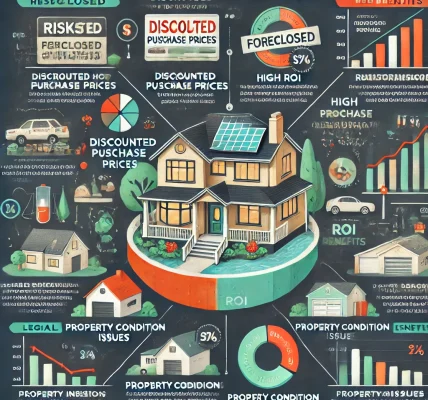The real estate industry is constantly evolving, influenced by technological advancements, demographic shifts, economic conditions, and regulatory changes. As an investor, staying ahead of these emerging trends can help you make informed decisions and maximize returns. In this guide, we will explore the key trends shaping the future of real estate and how investors can capitalize on them.
1. The Rise of Smart Homes and PropTech
Technology is revolutionizing the way we buy, sell, and manage properties. Smart home features, AI-powered analytics, and blockchain transactions are transforming the real estate landscape.
A. Smart Homes and IoT Integration
- Increasing demand for homes equipped with smart security systems, energy-efficient appliances, and automated climate control.
- Properties with smart home technology attract more buyers and renters, leading to higher property values.
B. PropTech Innovations
- Online real estate platforms use AI to match buyers with properties based on preferences and market trends.
- Virtual and augmented reality (VR/AR) are making remote property tours more accessible.
- Blockchain is enhancing transparency and reducing fraud in real estate transactions.
2. The Shift Towards Sustainable and Green Buildings
Sustainability is no longer an option but a necessity. Eco-friendly buildings are becoming a priority for both investors and tenants.
A. Demand for Energy-Efficient Homes
- Green certifications (e.g., LEED, Energy Star) increase property value and attract environmentally conscious buyers.
- Solar panels, energy-efficient HVAC systems, and water conservation technologies are gaining popularity.
B. Government Incentives for Green Buildings
- Many governments offer tax credits and rebates for sustainable real estate investments.
- Compliance with new environmental regulations ensures long-term viability and cost savings.
3. The Growth of Remote Work and Flexible Living Spaces
The shift to remote work has reshaped housing demands, influencing where and how people choose to live.
A. Suburban and Secondary Market Growth
- Urban exodus due to remote work flexibility is driving demand for suburban and rural properties.
- Investors can benefit from lower-cost housing markets with high rental demand.
B. Co-Living and Flexible Rental Options
- Increased demand for co-living spaces and short-term rental properties.
- The rise of “work-from-anywhere” policies has led to a surge in furnished, flexible lease apartments.
4. The Rise of Real Estate Investment Trusts (REITs) and Fractional Ownership
More investors are turning to digital and collective investment strategies to gain real estate exposure without direct property ownership.
A. Growth of REITs
- REITs offer diversified real estate investment opportunities with lower entry barriers.
- They provide passive income and liquidity compared to traditional real estate investments.
B. Fractional Ownership
- New platforms allow investors to own a fraction of high-value properties.
- Lower financial commitment with access to premium real estate markets.
5. The Impact of Interest Rates and Inflation on Real Estate
Economic fluctuations significantly impact real estate investment strategies.
A. Interest Rate Changes
- Higher interest rates increase borrowing costs but may lower property prices.
- Investors should explore creative financing options like seller financing or lease options.
B. Inflation-Resistant Investment Strategies
- Rental properties provide a hedge against inflation as rents typically rise with cost-of-living increases.
- Investing in tangible assets like real estate protects wealth from currency devaluation.
6. The Evolution of Urban Development and Smart Cities
Cities are adapting to the digital age, integrating smart infrastructure and sustainable urban planning.
A. The Growth of Smart Cities
- Adoption of AI-driven traffic management, smart grids, and automated building controls.
- Increased focus on walkable, mixed-use developments with integrated public transportation.
B. Mixed-Use Developments and Live-Work-Play Environments
- More demand for spaces that combine residential, office, retail, and recreational facilities.
- Investors should consider multi-use properties in rapidly growing urban areas.
7. The Future of Short-Term Rentals and Airbnb Investments
The vacation rental market is evolving due to shifting consumer preferences and regulatory changes.
A. Growing Demand for Unique Experiences
- Travelers seek boutique and experiential stays, such as eco-lodges and tiny homes.
- Investors can differentiate properties by offering themed stays and personalized services.
B. Local Regulations and Compliance Challenges
- Some cities impose restrictions on short-term rentals to control housing shortages.
- Investors must stay updated on zoning laws and tax implications.
8. The Role of Big Data and AI in Real Estate Decision-Making
Advanced data analytics and AI tools are improving market predictions and investment decisions.
A. Predictive Analytics for Market Trends
- AI-powered platforms analyze historical data to forecast property appreciation.
- Investors can identify high-growth areas before they become mainstream.
B. Automated Property Management
- AI-driven chatbots and property management software streamline tenant interactions.
- Predictive maintenance alerts reduce costly repairs and improve tenant satisfaction.
9. The Increasing Popularity of Alternative Housing Models
Non-traditional housing solutions are gaining traction due to affordability concerns and lifestyle changes.
A. Tiny Homes and Modular Construction
- Compact and prefabricated housing solutions are becoming viable investments.
- Lower construction costs and faster build times make them attractive options.
B. Senior Living and Assisted Living Facilities
- Aging populations are increasing demand for senior-friendly housing.
- Investors can explore healthcare-integrated real estate developments.
10. Final Thoughts: Adapting to the Future of Real Estate
The real estate industry is undergoing transformative changes, presenting both challenges and opportunities for investors. By staying informed about technological advancements, market shifts, and emerging trends, investors can position themselves for success.
Key Takeaways:
- Leverage smart home technology and PropTech solutions for enhanced investment decisions.
- Consider sustainable and green properties for long-term value.
- Adapt to remote work trends by investing in suburban and secondary markets.
- Explore REITs, fractional ownership, and alternative financing methods.
- Monitor economic indicators like interest rates and inflation to refine investment strategies.
Real estate will continue to evolve, and those who adapt to change will reap the greatest rewards. Stay ahead of the curve, conduct thorough research, and make data-driven investment decisions to build a successful real estate portfolio.




